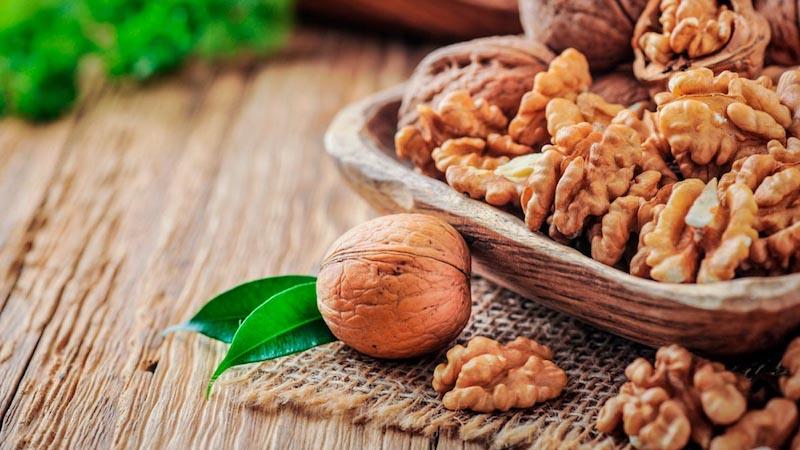
Walnuts have high levels of protein, fiber, calcium, magnesium, iron,omega-3 fatty acids, and healthy fats, so they are considered a part of a balanced diet.
Walnuts are a heart-healthy food, certified through the American Heart Association’s Heart-Check program. Many of the risk factors of heart disease can be controlled with dietary and lifestyle changes.
Walnuts are rich in nutrients. Eating walnuts increases brain power. It also improves the digestive system, as well as cures the problem of constipation too. Eating walnuts daily also boosts the immunity of the body. It is also called a powerhouse of energy.
Table of Contents
Reasons: Why Include Walnuts in Your Diet
Walnuts are very beneficial for health. Nutrients are found in abundance in walnuts. Walnuts are rich in fiber, protein, calcium, magnesium, and iron. Apart from this, walnuts also contain a good amount of phosphorus, copper, and omega-3 fatty acids. That’s why you must include walnuts in your diet.
According to a scientific study published on the website of NCBI (National Center for Biotechnology Information), the benefits of eating walnuts can prove to be helpful in keeping the heart healthy.
There are polyunsaturated fatty acids (PUFA) in walnuts, which are beneficial for the cardiovascular system. Apart from these benefits, it is also beneficial for those who have high blood pressure problems. Here polyunsaturated fatty acids (PUFA) help in the formation of good cholesterol (HDL) by reducing bad cholesterol (LDL) in the body, which can prevent cardiovascular diseases. (1).
How to Include Walnuts in Your Diet
Walnuts are rich in minerals and vitamins. You must include it in your diet for heart health. It can be eaten in many ways, which are as follows-
- Walnuts are eaten by garnishing the cake and putting them in the biscuits. Apart from this, it can be eaten lightly roasted or eaten raw.
- It can also be eaten by adding it to salads or adding some vegetables which are low in nutrients, which is a good way.
- If you are a vegan or a vegetarian, walnuts are a good source of protein and all nutrients.
- There is no need to remove the skin of walnuts. In fact, the skin of nuts is high in phytochemicals that have antioxidant and anti-inflammatory properties.(2)
- If you eat nuts after roasting, then do not mix salt in them because salt is harmful to high blood pressure.
- Eating walnuts on an empty stomach in the morning also has many benefits, although they can be eaten at any time of the day. But by eating an empty stomach in the morning, along with heart health, it is helpful in joint pain and overall health problems.
- The easiest way is to eat two or three pieces of walnuts with a glass of milk at bedtime.
How To Lower The Risk Of Heart Problem
Walnuts reduce the risk of heart problems. According to Lauren Pelehach Sepe, a clinical nutritionist at the Kellman Wellness Center in New York, NY, walnuts are some of the healthiest nuts you can eat.
“They are rich in healthy fats, antioxidants, as well as several essential minerals,” she explained to Medical News Today. “Given their beneficial nutritional profile, walnuts are an important part of a healthy diet, as they provide several crucial health benefits.”
Sepe said that walnuts offer more health benefits compared to other nuts because they contain the highest amount of omega-3 fatty acids also known as n-3 fatty acids of any nut.
“Omega-3 fatty acids are naturally anti-inflammatory. They also have been shown to lower triglyceride levels and reduce plaque formation, which is one mechanism by which they lower your risk of cardiovascular disease.” said Lauren Pelehach Sepe, clinical nutritionist
Sepe also cited a 2019 study showing that walnuts help provide cardiovascular benefits due to their impact on the gut microbiota.
“A healthy gut microbiome has been linked to reduced inflammation levels, which reduces your risk of cardiovascular disease, as well as improves your lipid profile, decreases your risk of metabolic disease, as well as many other health benefits,” she added.(3)
How many walnuts should you eat a day?
According to Sepe, there is no exact answer to determine how many walnuts a person should eat a day to enjoy the health benefits outlined in the study.
Still, she suggested that 1 ounce a day, which is about seven walnuts or 14 walnut halves, can provide benefits.
“They are easy to add to your daily diet, or you can have a larger serving several times a week,” she explained. “The goal is not so much a specific number, but to start including these and other nutrient-dense foods into your diet daily to confer maximum benefits.”
As for the next steps in this research, Sepe said she would like to see more research looking at all the mechanisms by which walnuts provide health benefits, namely their impact on the gut.
“This could lead to not only a better understanding of how walnuts may reduce the risk of cardiovascular disease but other health conditions as well,” she added.(3)
It is also written in a separate article
A young person can consume up to approximately 30 grams – or 1/3 of a cup of walnuts per day for a healthy diet(2). Not everyone’s dietary intake is the same. Therefore, you can take expert advice to know the proper dosage.
How To Store Walnut For A Long Time
Walnuts start spoiling very quickly, so to avoid them getting spoiled, some things should be taken care of. So that you can store them for a few months
If you want to store the peeled nut, store it in an airtight container in a cool place, away from sunlight. By doing this, it can be kept safe for three months.
At the same time, if you want to store unpeeled walnuts, then you can store them in the refrigerator and keep them for six months safe. Keep in your mind that walnuts take away the flavor of other things quickly. In such a situation, while keeping them in the fridge, keep them away from other food items.
Sources
Articles on healthnewsall are backed by verified information from academic research papers, reputed organizations, research institutions, and medical associations to ensure accuracy and relevance.
1-Postprandial Effects of Walnut Components Versus Whole Walnuts on Cardiovascular Disease (CVD) Risk Reduction
https://clinicaltrials.gov/ct2/show/NCT00938340
2-nuts and seeds
https://www.betterhealth.vic.gov.au/health/healthyliving/Nuts-and-seeds
3-Walnuts could reduce the risk of cardiovascular disease






